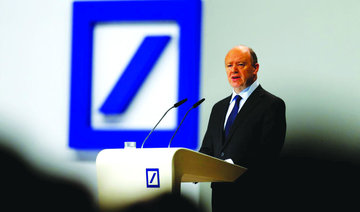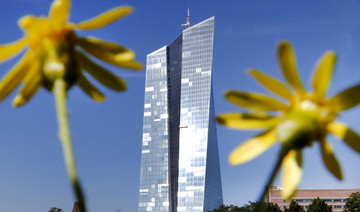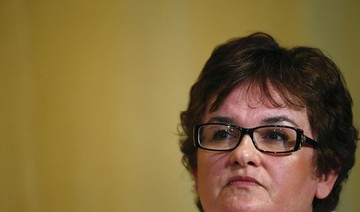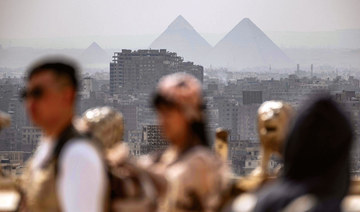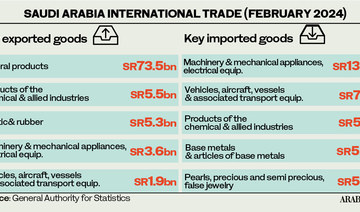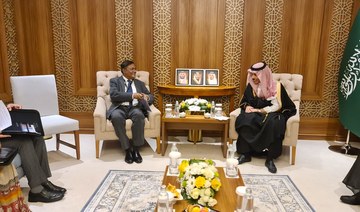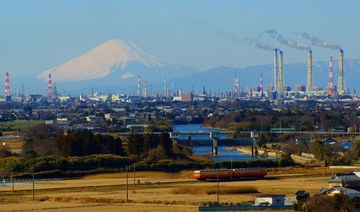FRANKFURT: European Central Bank President Mario Draghi said on Thursday the strength of the euro could affect the outlook for prices across the euro zone and would have to be taken into account in the bank’s future policy decisions.
The euro has gained 13 percent against the dollar this year, a mixed blessing for the ECB as it reflects a robust economy but caps inflation by making exports less competitive and reducing the cost of imports.
“The recent volatility in the exchange rate represents a source of uncertainty which requires monitoring with regard to its possible implications for the medium-term outlook for price stability,” Draghi said in a statement after the bank’s policy meeting.
“The exchange rate is not a policy target but it’s also very important for growth and inflation, and so important that the medium-term outlook for inflation was revised down in the staff’s projections,” Draghi added in a question and answer session.
The ECB lowered some of its inflation projections to reflect the firming euro but lifted some growth forecasts after the euro zone economy registered its best growth run in a decade.
The euro jumped to a nine-day high as Draghi explained the bank’s policy decisions.
He said the strength of the currency was beginning to worry a growing number of members of the ECB’s Governing Council and was likely to be a topic in its future discussions on monetary policy.
“In the last monetary policy meeting there were concerns expressed by a few, and these concerns were now reiterated by most members at this meeting,” Draghi told reporters.
“We will have to take into account this element (the exchange rate) in our information set in our future policy decisions,” he added.
As well as growth and inflation, Draghi said the euro’s strength could have an impact on exports. A stronger euro makes the bloc’s exports more expensive in other countries.
Earlier the ECB reaffirmed its ultra-easy policy stance, even keeping the door open to increasing bond purchases, dashing hopes it would formally signal its intent to claw back stimulus from next year.
The ECB kept rates at their record lows, confirmed that asset buys would continue at €60 billion ($71.76 billion) per month at least until December and said it could even increase or expand the asset purchases if needed, sticking with its long-held super-easy stance.
The statement is likely to rattle some investors who expected the ECB to start laying the groundwork for a cut in monetary stimulus because growth is robust, the threat of deflation long gone and unemployment falling fast — all supporting the case for removing at least some of the bank’s extraordinary measures.
“Clearly we should expect consequences from the appreciation of the exchange rate,” Draghi said.
— Reuters
ECB chief Draghi says euro is important factor in future policy decisions
ECB chief Draghi says euro is important factor in future policy decisions
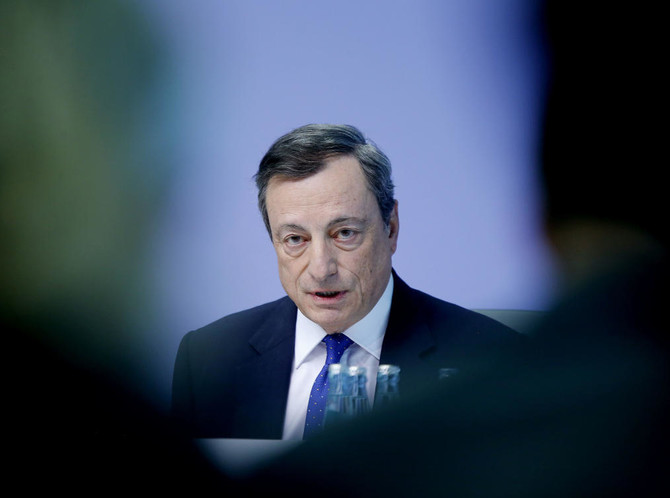
Egypt’s net foreign assets deficit shrinks $17.8bn in March
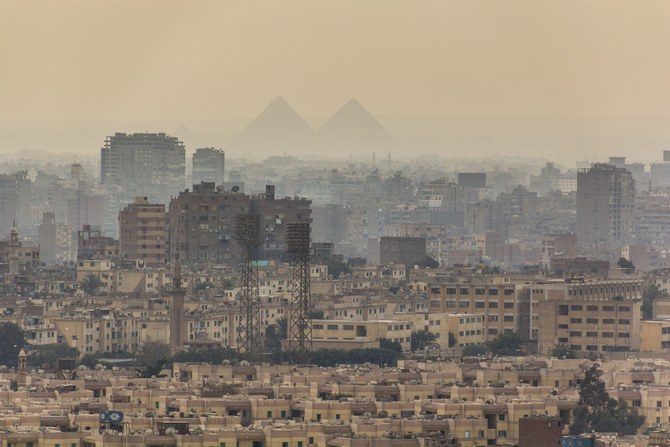
CAIRO: Egypt’s net foreign assets deficit shrank $17.8 billion in March, its second month of decline, central bank data showed, after remittances, foreign portfolio investment and a $5 billion payment from the UAE poured into the country, according to Reuters.
Egypt received a second $5 billion payment from the UAE in early March for a land development on the Mediterranean coast after an initial payment in February.
On March 6, it devalued its currency and announced an $8 billion agreement with the International Monetary Fund, triggering a flood of portfolio investments and remittances from workers abroad.
The March NFA deficit shrank to 200 billion Egyptian pounds ($4.18 billion) from 679 billion pounds in February.
The March NFA figures does not reflect an $820 million first instalment in early April under the expanded IMF financial support program.
Commercial banks’ foreign assets jumped by $7.4 billion in March while their liabilities slid by $3 billion, according to Reuters calculations based on central bank data and taking account of the March 6 devaluation.
Egypt has allowed its currency to weaken to 47.8 pounds to the dollar since it signed the IMF agreement after having left it fixed at 30.85 to the dollar for a year.
Central bank foreign assets rose by $3.5 billion while its foreign liabilities decreased by $3.9 billion.
NFAs represent both central bank and commercial bank assets held by non-residents, minus their liabilities.
The $17.4 billion reduction in the deficit followed a $7.04 billion reduction in February.
Before that, the central bank had been drawing on the NFAs over the past two and a half years to help support the country’s currency. In September 2021, NFAs stood at a positive $3.9 billion.
Oil Updates – prices fall for a 3rd day as Middle East ceasefire hopes rise
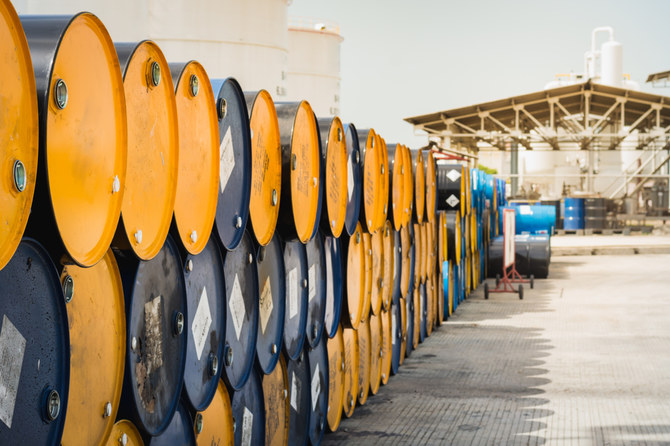
NEW YORK/SINGAPORE: Oil prices fell for a third day on Wednesday amid increasing hopes of a ceasefire agreement in the Middle East and rising crude inventories and production in the US, the world’s biggest oil consumer
Brent crude futures for July fell 70 cents, or 0.8 percent, to $85.63 a barrel by 7:56 a.m. Saudi time. US West Texas Intermediate crude for June declined 75 cents, or 0.9 percent, to $81.18 per barrel.
Expectations that a ceasefire agreement between Israel and Hamas could be in sight, following a renewed push led by Egypt to revive stalled negotiations between the two, pushed oil prices lower.
“The potential for a ceasefire agreement between Israel and Hamas has eased concerns of an escalation of the conflict and any possible disruptions to supply,” ANZ analysts said in a note on Wednesday.
However, Israeli Prime Minister Benjamin Netanyahu vowed on Tuesday to go ahead with a long-promised assault on the southern Gaza city of Rafah, whatever the response by Hamas to the latest proposals for a halt to the fighting and a return of Israeli hostages.
Also pressuring prices were swelling US crude oil inventories and rising crude supply.
US production rose to 13.15 million barrels per day in February from 12.58 million bpd in January, its biggest monthly increase in about 3-1/2 years, the Energy Information Administration said on Tuesday.
“Continued signs of inflation also raised concerns about demand for crude oil. This comes ahead of the US driving season, where demand for gasoline rises strongly,” analysts at ANZ said.
Keeping oil from slipping further, output by the Organization of the Petroleum Exporting Countries was seen falling by 100,000 bpd in April to 26.49 million bpd, a Reuters survey found on Tuesday.
The survey reflected lower exports from Iran, Iraq and Nigeria against a backdrop of ongoing voluntary supply cuts by some members agreed with the wider OPEC+ alliance.
Saudi Arabia’s real GDP rises by 1.3% in first quarter: GASTAT
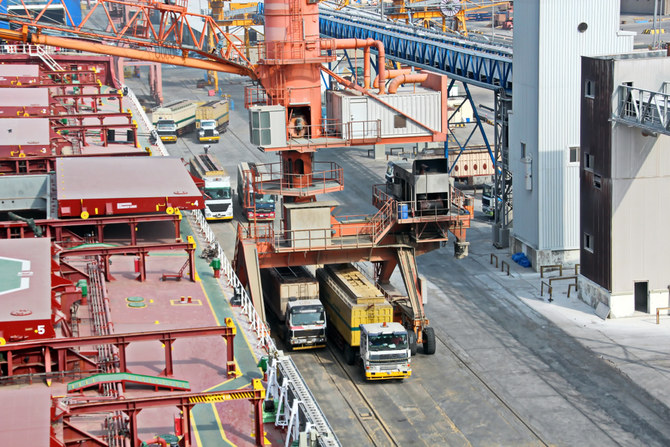
RIYADH: Saudi Arabia’s real gross domestic product saw a 1.3 percent rise in the first three months of this year compared to the previous quarter, official data showed.
According to the General Authority for Statistics, this rise in real GDP was propelled by oil and non-oil activities which increased by 2.4 percent and 0.5 percent during the period, respectively.
On the other hand, government activities in the Kingdom witnessed a decline of 1 percent in the first quarter of this year, compared to the last quarter of 2023.
However, GASTAT revealed that Saudi Arabia’s real GDP decreased by 1.8 percent in the first quarter of 2024 compared to the same period of the preceding year.
The authority attributed this decline to a drop in oil activities, which decreased by 10.8 percent year-on-year in the first quarter. The fall in oil exports stemmed from the Kingdom’s decision to curtail crude output, in line with an agreement by the Organization of the Petroleum Exporting Countries and its allies, collectively known as OPEC+.
In a bid to maintain market stability, Saudi Arabia decreased its oil output by 500,000 barrels per day in April 2023, a measure that has now been extended until December 2024.
Meanwhile, non-oil activities in the Kingdom witnessed a 2.8 percent year-on-year increase in the first quarter, with government activities experiencing a growth of 2 percent during the same period.
Saudi Arabia, UAE supplied 85% of Japan’s crude oil in March
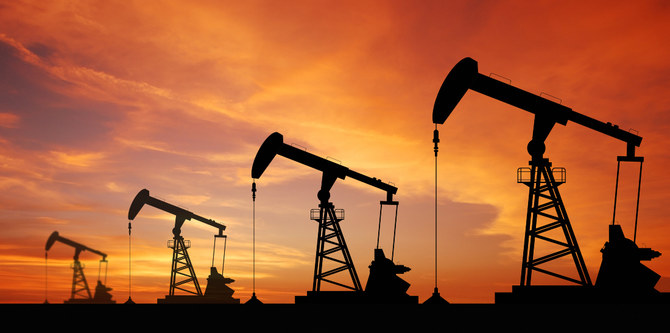
- Further 10% of Japan’s needs were from Arab sources including Kuwait, Qatar, Oman and the Neutral Zone
TOKYO: Saudi Arabia and the UAE provided 85 percent of Japan’s total crude oil needs in March, according to the Agency of Natural Resources and Energy of the nation’s Ministry of Economy, Trade and Industry.
A further 10 percent of Japan’s needs were from Arab sources including Kuwait, Qatar, Oman and the Neutral Zone. This means that the Arab region provided nearly 95 percent of Japan’s needs.
Crude oil represents about a third of Japan’s energy needs.
Japan imported 32.77 million barrels from the UAE, or 44.1 percent of total imports, in March. Saudi Arabia’s share amounted to 30.51 million barrels, or 41 percent of total imports.
During March, Japan imported 74.39 million barrels of oil, of which the Arab share was 94.7 percent, or 70.45 million barrels.
Kuwait provided 5.12 million barrels (6.9 percent) and Qatar 1.56 million barrels (2.1 percent). Japan imported 0.1 percent from Oman and 0.6 percent from the Neutral Zone.
With Japan’s ban on importing oil from Iran and Russia continuing in March, the rest of the country’s oil imports came from the US (4.1 percent), Central and South America (0.9 percent), and Oceania (0.3 percent).
Europe to launch chamber of commerce in Riyadh
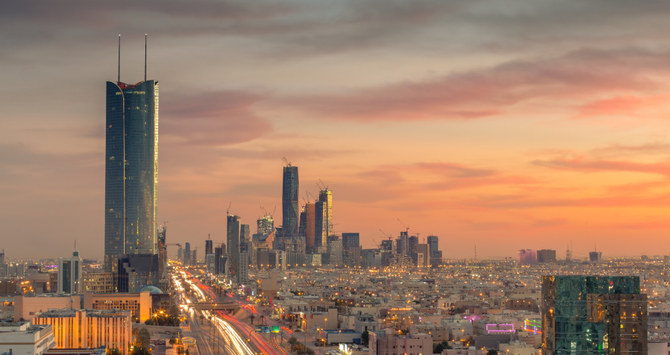
RIYADH: The first European Chamber of Commerce in the Gulf region will open next week in Riyadh, the EU’s special representative for the Gulf region has told Arab News.
Luigi Di Maio said the new body would bring Saudi and European companies together to enhance trade and cooperation.
“We’ve worked very hard with the Ministry of Investment, your Ministry of Trade. The EU delegation in Riyadh did a great job. And now we are going to inaugurate this chamber,” Di Maio said.
“That is in order to bring closer our companies, Saudi companies and European companies, to take on both sides the new opportunities of the Vision 2030 program … of our new European Green Deal, Next Generation EU, and others.”
Saudi Arabia’s Vision 2030 reform program had transformed the global business community’s view of the Kingdom, Di Maio said. “The ambitions, especially economic ambitions, of Saudi Arabia are totally changing perceptions of the Kingdom around the world,” he said. “There is a business community that is more and more interested in these ambitions, in this vision, and in a new generation of dreamers in this country.”
There was a growing recognition of the Kingdom’s diplomatic and economic influence, Di Maio said. “Saudi Arabia is becoming more and more the point of reference because now it is implementing its vision for the region that is not just an economic ambition, but is a new policy and new initiatives in order to de-escalate, to make the region in peace and wind down on tensions like the tension that we are experiencing now.
“The partnership and the strategic partnership between the EU and GCC countries, in particular with countries like Saudi Arabia, is vital.”


